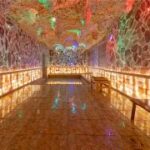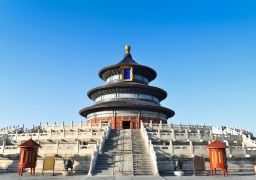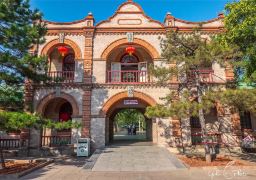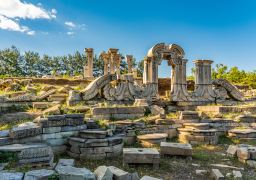Many in China are familiar with the ancient and renowned White Horse Temple in Luoyang and the famous Shaolin Temple on Mount Song. However, less known is the Tiankai Temple in Beijing, established during the year of Jia Wu (the tenth year of Jian Wu; AD 34), when great Bodhisattvas from the Western Regions entered the realm of the sages.
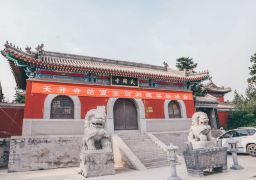
In the spring of Geng Xu (the twenty-sixth year of Jian Wu; AD 50), the Indian monk Huayan Huisheng of the Dharma came to this mountain to spread Buddhism, subdue the Black Dragon King, and establish Tiankai Temple, attracting tens of thousands of followers. This ancient temple is located on Yuanbao Mountain in Han Cunhe Town, Fangshan District, southwest of Beijing, and is blessed by the spiritual wisdom of Tiankai Village, Empress Terrace Village, and Longmenkou Village.
With a history of nearly 2000 years, it is one of China’s most historic temples. A popular saying in the Liupin Mountain area states: ‘Tiankai Temple existed before Shangfang Mountain.’ From its founding in the Eastern Han Dynasty through the Northern Wei, Jin, Tang, Song, Liao, Jin, Yuan, Ming, and Qing dynasties, Tiankai Temple has had over a hundred subordinate temples, forming a vast interconnected Buddhist cultural circle centered around it, becoming a sacred place for the propagation of Buddhism and the enlightenment of people’s hearts.
Through the vicissitudes of life and the rise and fall of dynasties, Tiankai Temple has been rebuilt by successive generations of great masters and has produced many eminent monks.Great masters and Buddhist scholars have resided here, upholding the Dharma and spreading the teachings. The lineage has been passed down for a thousand years without interruption, always standing out in the monastic community and helping countless beings.
Tiankai Temple is also the sacred site where the relics of the Buddha Shakyamuni were unearthed. In 1984, ground lights appeared near the ancient pagoda of Tiankai Temple, attracting the attention of local governments and the media. In 1990, the National Cultural Relics Bureau and related units conducted an in-depth excavation and confirmed the existence of rare national treasures—the relics of the Buddha Shakyamuni! At that time, since Tiankai Temple had not yet been restored, the Buddha’s relics were enshrined in the recently restored Yunju Temple. Other artifacts were cataloged by the Cultural Relics Bureau. Historical records indicate that there were fifteen Buddha relics in the pagoda, four of which have been unearthed.
Starting in 2005, Yu Xifa, the chairman of Beijing Fangshan Longmen Ecological Garden and a philanthropist, generously funded the reconstruction of Tiankai Temple. With the joint efforts of great monks and believers, the temple was built, monks were invited, the Dharma was spread, and the site was adorned, allowing Tiankai Temple to shine brightly once again. Today, Tiankai Temple covers an area of 126 acres, built along the mountains and waters, with a grand and solemn architectural scale. Tiankai Temple includes five temples (lower court: Tiankai Temple, Tiankai Pagoda, Buddha Recitation Hall, Guanyin Temple, upper court: Xinglong Zen Temple) and enshrines several precious jade Buddhas invited from Myanmar, as well as a beautifully crafted.A 3-meter-tall hand-painted Thangka, which is one of the largest in Beijing.
On September 15, 2010, with the approval of the Beijing Municipal Government, the Fangshan District Civil Affairs Bureau issued a ‘Religious Activity Venue Certificate’ to Tiankai Temple. It was established that Master Yanfo would preside over the overall Dharma affairs of Tiankai Temple, leading the monastic community to inherit the Buddha’s family business, promote the excellent traditions of Buddhism, love the country and religion, follow the Buddha’s system, and strictly observe the pure precepts.
On September 8, 2014, with the approval of the Beijing municipal government at all levels, Tiankai Temple welcomed the ‘Buddha’s relics’ back to the Tiankai Pagoda for long-term enshrinement. Throughout the year, various courtyards of Tiankai Temple regularly hold Buddhist activities such as scripture lectures, meditation, Buddhist seven-day retreats, blessing and disaster relief, teaching the Three Refuges and Five Precepts, and Buddhist cultural exchanges. It serves as a pure land for mountain pilgrimage, sightseeing, and spiritual purification.
Full text Opening hours: Open all year round from 09:00 to 17:00.
Preferential policies Additional notes: 1. The scenic area has a unified pricing policy with no other preferential policies at present; 2. The information provided is for reference only and subject to the announcement on the day of the visit.



